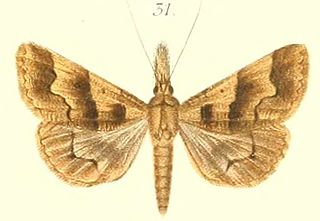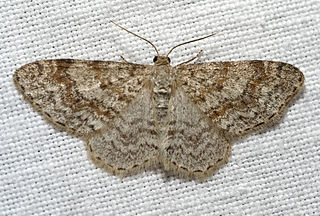
Carposinoidea, the "fruitworm moths", is a superfamily of insects in the lepidopteran order. The superfamily is also known as Copromorphoidea, which is a junior synonym. These moths are small to medium-sized and are broad-winged bearing some resemblance to the superfamilies Tortricoidea and Immoidea. The antennae are often "pectinate" especially in males, and many species of these well camouflaged moths bear raised tufts of scales on the wings and a specialised fringe of scales at the base of the hindwing sometimes in females only; there are a number of other structural characteristics. The position of this superfamily is not certain, but it has been placed in the natural group of "Apoditrysia" "Obtectomera", rather than with the superfamilies Alucitoidea or Epermenioidea within which it has sometimes previously been placed, on the grounds that shared larval and pupal characteristics of these groups have probably evolved independently. It has been suggested that the division into two families should be abandoned.

Lyclene is a genus of lichen moths of the family Erebidae, subfamily Arctiinae. The genus was erected by Frederic Moore in 1860.

Ophyx is a genus of moths of the family Erebidae.
Glaucoclystis is a genus of moths in the family Geometridae.

Asthenini is a tribe of geometer moths under subfamily Larentiinae first described by Warren in 1893. The tribe has been combined with Eupitheciini in the past, most notably by Jeremy Daniel Holloway in his work The Moths of Borneo.

Eupitheciini is a tribe of geometer moths under subfamily Larentiinae, often referred to as pugs. The tribe was described by Tutt in 1896.
Glaucoclystis immixtaria is a moth of the family Geometridae described by Francis Walker in 1862. It is known only from Sri Lanka, the Chagos Archipelago, Queensland and Fiji. It could prove to be more widely distributed, with populations in more seasonally dry habitats such as Java and the Lesser Sunda Islands.
Glaucoclystis gonias is a moth in the family Geometridae. It is found in Australia (Queensland).
Glaucoclystis azumai is a moth in the family Geometridae. It is found in Japan.
Glaucoclystis acygonia is a moth in the family Geometridae first described by Charles Swinhoe in 1895. It is found in the north-eastern Himalayas.
Glaucoclystis polyclealis is a moth in the family Geometridae described by Francis Walker in 1859. It is found in Sri Lanka and on Borneo, Java and Bali.
Glaucoclystis hyperocha is a moth in the family Geometridae. It is found in Australia.
Glaucoclystis griseorufa is a moth in the family Geometridae. It is found in the north-eastern Himalayas and on Peninsular Malaysia and Borneo. The habitat consists of lowland forests.
Glaucoclystis sinuosoides is a moth in the family Geometridae. It is found on Borneo. The habitat consists of lowland dipterocarp forests.
Glaucoclystis sinuosa is a moth in the family Geometridae first described by Charles Swinhoe in 1895. It is found in the north-eastern Himalayas.
Glaucoclystis polyodonta is a moth in the family Geometridae first described by Charles Swinhoe in 1895. It is found in the Indian subregion and on Borneo, Sulawesi, the Bismarck Archipelago and New Guinea. The habitat consists of upper montane and dipterocarp forests.
Gymnoscelis fasciata is a moth in the family Geometridae. It is found in India and on Peninsular Malaysia, Borneo, the Philippines and Sulawesi. The habitat consists of upper montane and dipterocarp forests.
Gymnoscelis exangulata is a moth in the family Geometridae. It is found on Seram, New Guinea and the Solomon Islands.
Glaucoclystis spinosa is a species of moth in the family Geometridae. It is found in Japan.




